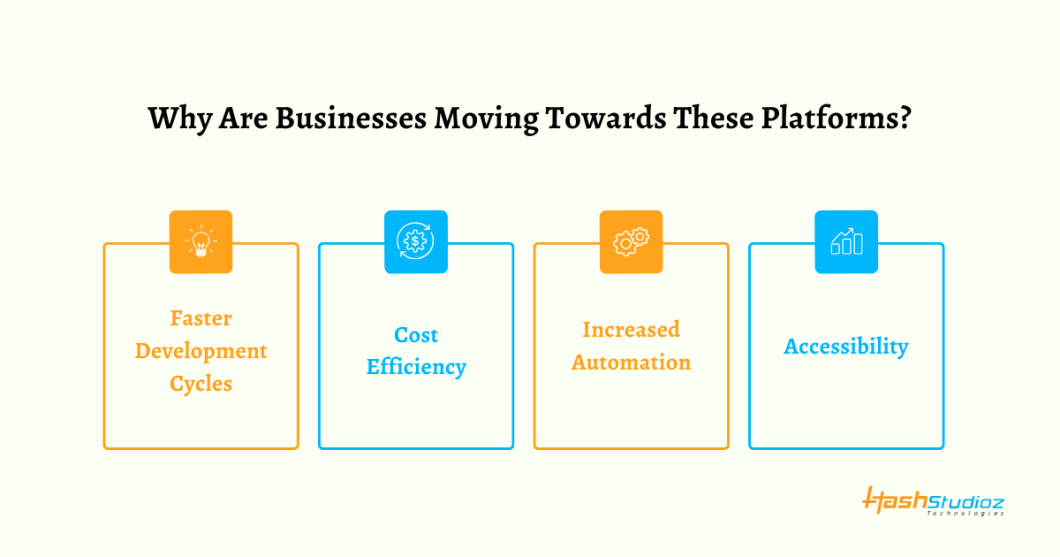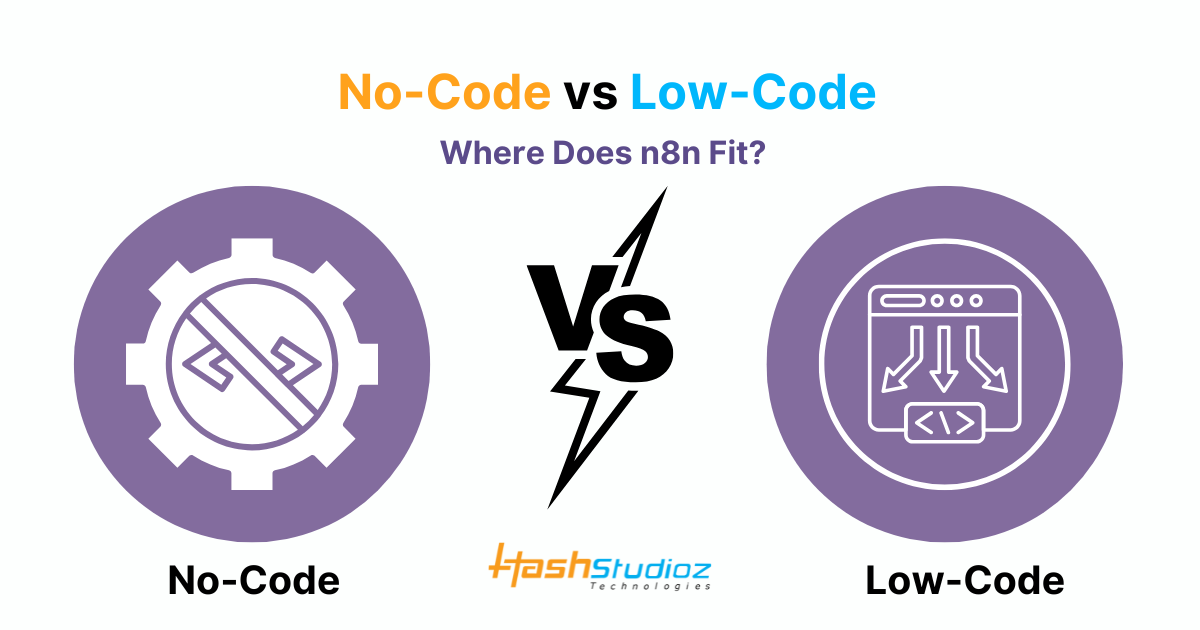According to Gartner, by 2025, 70% of new enterprise applications will be developed using no-code vs low-code technologies. Additionally, Forrester reports that 84% of organizations already use or plan to adopt these platforms. In recent years, the emergence of no-code vs low-code platforms has transformed the way businesses approach software development. These tools enable users—including those with minimal coding experience—to build applications and automate workflows quickly. However, many businesses still struggle to understand where tools like n8n fit into this growing and evolving no-code vs low-code landscape.
Table of Contents
- The Rise of No-Code and Low-Code Platforms
- The Core Difference Between No-Code and Low-Code
- Why Are Businesses Moving Towards These Platforms?
- Enter n8n: An Open-Source Automation Tool
- n8n in the No-Code vs Low-Code Debate
- The Advantages of Using n8n
- Use Cases for n8n in Custom and Manufacturing Software Development
- Why Work with HashStudioz?
- Conclusion
The Rise of No-Code and Low-Code Platforms
Before we dive into the specifics of n8n, it’s important to understand the broader context. The rise of no-code and low-code platforms can be attributed to the increasing demand for faster development cycles and the growing need for businesses to automate processes.
What Is No-Code?
No-code platforms allow users to create applications without writing a single line of code. These platforms are designed with simplicity in mind and come with drag-and-drop interfaces, pre-built templates, and integrations with third-party services. The goal is to make application development accessible to anyone, even those without a background in software development.
For example, platforms like Bubble and Webflow are popular no-code tools. They allow users to build web applications, design websites, and even manage databases without needing programming skills.
What Is Low-Code?
Low-code platforms, on the other hand, provide a balance between visual interfaces and the ability to write custom code when necessary. While these platforms offer drag-and-drop functionality and pre-built components, they also allow developers to write code to customize workflows and add complex features.
Popular low-code platforms include OutSystems and Mendix, both of which cater to enterprises that require more flexibility than no-code platforms can offer.
The Core Difference Between No-Code and Low-Code
| Feature/Aspect | No-Code | Low-Code |
| Interface | Fully visual, no coding required | Visual interface with coding support |
| Target Users | Business users, non-developers | Developers, IT professionals |
| Application Complexity | Best for simple apps and workflows | Suitable for complex, enterprise-level applications |
| Customization | Limited to built-in features | High, with custom code support |
| Use Cases | Forms, dashboards, internal tools | Core systems, APIs, custom business logic |
| Integration Options | Limited, mostly popular third-party apps | Broad, including legacy systems and custom APIs |
| Development Speed | Very fast, often within days | Fast with flexibility for custom needs |
| Scalability | Limited, not ideal for large systems | Scalable for large, growing applications |
| Learning Curve | Low, easy for first-time users | Moderate, requires some technical knowledge |
| Maintenance | Simple, platform-managed | Requires developer involvement for updates and changes |
| Flexibility | Low, constrained by platform rules | High, adaptable to diverse business needs |
Why Are Businesses Moving Towards These Platforms?
There are several reasons why companies, including Custom Software Development Company and Manufacturing Software Development Companies, are turning to no-code and low-code platforms:
1. Faster Development Cycles
Traditional development often takes months. No-code and low-code platforms allow businesses to design, test, and deploy applications quickly—often within days or weeks—accelerating project timelines and boosting productivity.

2. Cost Efficiency
Building custom software is expensive. No-code and low-code platforms reduce development costs by minimizing the need for large teams and long timelines, providing functional solutions at a lower total investment.
3. Increased Automation
Manual tasks slow down operations. No-code and low-code tools, especially with automation platforms like n8n, help businesses create automated workflows to improve speed, accuracy, and overall operational efficiency.
4. Accessibility
With developer shortages increasing, companies need alternatives. These platforms enable non-technical staff to create solutions internally, reducing dependency on developers and allowing faster responses to business needs.
Enter n8n: An Open-Source Automation Tool
n8n is an open-source workflow automation tool that enables users to automate processes across a wide variety of platforms. While not a traditional no-code or low-code platform in the strictest sense, it provides capabilities that overlap with both. The question then becomes: where does n8n fit in the larger ecosystem of no-code and low-code tools?
What Is n8n?
n8n stands for “Node-RED for a more powerful experience” and is a powerful, open-source workflow automation platform. It enables users to automate repetitive tasks by connecting different services, applications, and APIs.
What sets n8n apart from many other no-code or low-code platforms is its open-source nature. This allows businesses, including Custom Software Development Companies, to customize the platform extensively according to their unique needs.
Core Features of n8n
- Workflow Automation: n8n allows users to automate complex workflows by connecting various apps and services. For example, a Manufacturing Software Development Company could automate the transfer of data from an inventory management system to a production planning tool.
- Hundreds of Integrations: n8n supports over 200 integrations with popular services like Google Sheets, Slack, Salesforce, and others. This makes it an excellent choice for businesses that rely on multiple platforms for their day-to-day operations.
- Custom Code Capabilities: Unlike traditional no-code platforms, n8n allows users to write JavaScript to extend the functionality of workflows. This provides a level of flexibility that is often required by Custom Software Development Companies when they need to implement complex business logic.
- Open-Source Nature: The open-source model gives businesses full control over their automation setup. This is especially valuable for those with specific security or customization requirements.
- Self-Hosting: n8n can be self-hosted, which is an important feature for businesses that require full control over their infrastructure, data privacy, and security.
n8n in the No-Code vs Low-Code Debate
While n8n is not strictly a no-code or low-code platform, it brings elements of both approaches to the table. Here’s how n8n fits into the larger discussion:
1. n8n as a No-Code Tool
For many users, especially those in non-technical roles, n8n can be used in a no-code fashion. The platform’s visual interface allows users to build workflows without writing any code. This is ideal for businesses that want to automate repetitive tasks without requiring a deep understanding of programming languages.
2. n8n as a Low-Code Tool
For technical users, n8n offers the ability to write custom code within workflows, making it a low-code tool as well. Developers can use JavaScript to create custom logic, manipulate data, or integrate with APIs that may not have a pre-built integration.
3. n8n in the Enterprise Space
For larger companies, such as Manufacturing Software Development Company or enterprises with complex workflows, n8n can be used as part of a larger automation strategy. While no-code and low-code tools provide an easy way to create simple automations, n8n offers the flexibility required for more sophisticated business logic and integrations.
The Advantages of Using n8n
1. Cost-Effective
n8n’s open-source platform helps businesses reduce costs by eliminating high licensing fees. It offers powerful automation without the financial burden of commercial tools, making it ideal for budget-conscious teams.
2. Flexibility and Customization
n8n allows users to write custom code within workflows, offering more control and flexibility. This makes it ideal for companies with unique automation requirements that off-the-shelf tools can’t address.
3. Scalability
n8n is designed to manage high workflow volumes efficiently. Its scalable architecture supports both small startups and large enterprises, allowing automation systems to grow alongside evolving business demands.
4. Data Privacy and Control
With n8n’s self-hosting capability, businesses maintain full control over their data. This is essential for industries handling sensitive or regulated information where third-party data storage poses security risks.
Use Cases for n8n in Custom and Manufacturing Software Development
1. Supply Chain Automation
For a manufacturing software development company, n8n can streamline operations by automating key supply chain processes. It enables real-time order tracking, automatic inventory updates, and seamless communication between suppliers and manufacturers. These automations reduce manual errors, improve response times, and ensure consistent data flow across the production and distribution network.
2. CRM Integration
A custom software development company can leverage n8n to connect CRM systems with other essential tools such as marketing platforms, helpdesks, and messaging services. This integration enables better customer tracking, automated follow-ups, and centralized data management, enhancing customer experience and reducing the workload on sales and support teams.
3. Employee Onboarding
Automating employee onboarding with n8n simplifies repetitive HR tasks. The platform can manage document collection, initiate welcome emails, assign training materials, and provide system access. By automating these steps, organizations improve onboarding consistency, reduce administrative time, and ensure every new hire has a smooth and efficient start.
4. Custom Reporting
Businesses needing custom reports can use n8n to pull data from multiple platforms like CRM, ERP, and analytics tools. It can format this data and generate scheduled reports for decision-makers. This automation saves time, ensures accuracy, and provides up-to-date insights critical for operational and strategic planning.
Why Work with HashStudioz?
At HashStudioz, we are more than just a development firm—we are your technology partners. As a leading Custom Software Development Company and Manufacturing Software Development Company, we specialize in:
- Implementing low-code and no-code platforms.
- Integrating open-source tools like n8n.
- Building custom automation workflows tailored to your business needs.
- Ensuring data privacy and secure deployments with self-hosted solutions.
Let’s Automate Your Business the Smarter Way
Talk to our experts at HashStudioz. We’ll help you design and implement powerful automation strategies—while keeping your infrastructure, costs, and goals in focus.
Conclusion
No-code and low-code platforms have become game-changers in the world of software development, enabling businesses to build and automate applications more efficiently than ever before. While both approaches have their merits, n8n offers a unique blend of simplicity and flexibility that makes it suitable for both non-technical users and developers.
For businesses such as Custom Software Development Companies and Manufacturing Software Development Companies, n8n provides a powerful tool for automating workflows and integrating disparate systems. By understanding where n8n fits into the no-code vs low-code debate, companies can better leverage its capabilities to drive efficiency and innovation in their operations.

